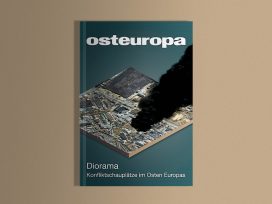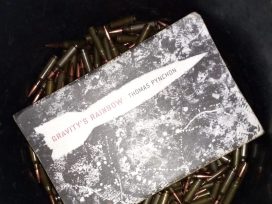Of fish and people
Belarusian and Ukrainian intellectuals have been applying postcolonial theory to Russia since the 1990s. But they have largely been ignored in the West. Now it is time to listen to those voices from the ‘borderlands’.
1. War and peace
There are some who believe that philosophy makes things more complicated than they really are. There are others who maintain that we do not know the nature of things and that philosophy simply shows them to be more complicated than they seem. There are, however, certain contexts in which clarity is desirable, and for that reason I will begin with definitions.
When we speak of the ‘Russian World’, we have in mind a particular ideological doctrine and the corresponding actions of the Russian state. These became fully apparent in 2014–2015, although they have been present in the political and cultural fields in latent form for much longer. Normally we place this new ‘Russian World’ between inverted commas, to distinguish it from its earlier sense as the ‘cultural and economic support of Russians living outside Russia’, as well as from its general sense, which can include the beautiful utopia of Russian culture beyond barriers, frontiers and states.
The ‘Russian World’ of today is a brutal and aggressive neo-imperialism directed first and foremost at Russia’s closest neighbours. But it also carries within it a general, ‘geopolitical’ vision of the world. It suggests a future for humankind in which powerful rulers effectively divide resources and territory among themselves with impunity.
The fundamental conceptual emotion at the heart of the ‘Russian World’ is post-colonial resentment. When it rises to the surface it becomes a sense of injury: ‘Why does no one love Russia?’; ‘Why are Russia’s interests not considered?’; ‘Why has Russia been forgotten?’ Its attempts at destabilising the world order are essentially a way to allow Russia to enter the brave new world in which it too will ‘have rights’. The right to wage war. The right to lie. The right to kill and imprison dissenters. The right to cynically ignore public opinion. A brave new world in which Russia will have to be ‘reckoned with’.
This postcolonial resentment has been brewing for a long time. The symptoms have been visible since the second half of the 1990s. However, its entry into a brutal and aggressive phase occurred so suddenly that it came as a real shock to observers, both in Russia and in Europe. Even now, almost ten years since Russia’s annexation of Crimea, I cannot recall any analysis in a western European language that, rather than simply setting out what is happening and apportioning blame, has sought to discern the thinking that lies behind the concept of the ‘Russian world’ and to raise the question of the new age in which our merry postmodernisms and considerably less merry post-communisms have landed us. A text in which there was critical reflection on – and even a deconstruction of – the practices of imperial thought, and not just a calculation of risks and consequences.
The idea of ‘empire’ is something conceived first and foremost in the mind and in writing. Only then does it begin to work in the reality of politics and economics. An empire comprises not just of an army, secret services and colonial administration. It also involves values, emotions and cultural codes. It is a picture of the world that imposes itself as something universal.
But in the cultural space of Europe today there is not just an absence of reflective writing on Russian imperialism. More importantly, there are no places in which such reflection could take place. And no language in which such critical expression could be expressed.
This seems odd: after all, the twentieth century witnessed an overproduction of critical theory. However, it is obvious that neo-Marxism, post-modernism, even the cynical reasoning of Sloterdijk or Žižek’s fairground Lacanianism, are in no way capable of describing the new reality that has been laid bare by the Russia-Ukraine war and the Belarusian revolution.
Now we are ready to be honest. To admit that we don’t understand what is happening to us or what kind of era we have just entered.
One perspective from which the future may be visible today is the eastern European borderland. And the language in which we can conceptualize this new epoch may be that of Belarusian and Ukrainian postcolonial theory. It is this language that may be able to form and interpret the experience of collision with empire. And the experience of surviving this collision, of defending our agency and our dissimilarity.
For this is what is most surprising: that even though the empire has been at work unceasingly for the past two centuries, the eastern European borderland has not disappeared. It has not been consumed in the melting pot of empire and the Soviet nation. On the contrary, it has grown stronger in its paradigmatic otherness.
Today, the eastern European borderland is not just a regional identity, but a real conceptual alternative to the ‘Russian World’.
In his classic essay on the tragedy of Central Europe, Milan Kundera compared the central European paradigm of ‘maximum variety within the minimum space’ with the Soviet paradigm of ‘minimum variety within the borders of the maximum space’. Taking up this distinction, we could say that the eastern European borderland is not simply there for the defence of Ukraine. Or for the support of the Belarusian revolution. It is above all there for the defence of diversity.
This is a war for diversity. A war between Central Europe and Eastern Europe.
*
In Belarus there is a long intellectual tradition of deconstructing the eastern neighbour. It is a tradition encoded in the nation’s underlying identity myths and could be said to have begun at the same time as the ‘Belarus Project’ itself. This was more than just another nation-building project combined with a significant social element (the emancipation of the Belarusian village); it was also an anti-colonial project (social emancipation was not possible without dismantling the structures of imperial oppression).
Adam Mickiewicz was the first in the eastern European borderland tradition to write a critique of empire, primarily in the drama Forefathers’ Eve, but also in The Books of the Polish Nation and in his journalism of the 1830s. Then came Janka Kupala’s play The Locals, a classic example of the literary treatment of colonial trauma. Kupala was followed by Ihnat Abdziralovič and Uladzimir Samojla, who elaborated the metaphysics of Belarusian anti- and post-colonial agency. Completing the list is Zianon Paźniak’s classic essay ‘On Russian imperialism and its dangers’, in place of the whole range of postcolonial analytical writing produced at the end of the 1990s. Eastern European borderland intellectuals continue to pose relevant questions and offer ever newer versions of answers to them.
Now and again, it seems that there is simply too much of this in culture. That the primary task should be to ‘forget about empire’ and to switch at last to a regime of normality: to remind ourselves that we are ‘all in the same boat’. But no sooner have intellectuals attempted to tackle this task, than history takes another turn, and once again we wake up in bed with Empire. Painfully, we try to remember what happened and strive to grasp how it’s all going to end this time.
*
The application of western postcolonial theory to the eastern European borderland was pioneered by the Ukrainian diaspora. In the early 1990s, the Australian literary theorist Marko Pawlyshyn and the American anthropologist Oksana Grabowicz showed that what Franz Fanon, Edward Said and even Homi Bhabha were saying was also about us. But it was two Kyiv intellectuals, the novelist Oksana Zabuzhko and political essayist Mykola Riabchuk, to whom we owe the development of an eastern European borderland theory. They brought postcolonial theory out of the academic ghetto and transformed it into cultural politics. By the end of the 1990s, Ukraine was already conceptually prepared for a ‘post-imperial’ situation.
On the Russian intellectual scene, the situation was much less positive. For example, the publisher of the 2006 Russian translation of Edward Said’s Orientalism was Russkii Mir (Russian World). The preface drew readers’ attention to the fact that Said was a Palestinian, that he was criticizing the West and was, if not an ally, then at least a ‘fellow traveller’ of Russia. What the preface failed to mention is that Said’s book had given rise to one of the most powerful and influential critical discourses on empire (all empires) to date.
Another example: in 2006 the Bolshoi Drama Theatre in St Petersburg put on Brian Friel’s play Translations. The Russian translator, Mikhail Stronin, translated the title as Nuzhen perevod, ‘Translation needed’. Friel’s play, first performed in 1980 and studied in universities as a postcolonial classic, depicts the violence with which the imperial power rewrites space, breaking the worlds in which the inhabitants live as well as the geography and cultural tradition of the place. It is impossible to conceive of a more inadequate understanding of the play’s mission than ‘translation needed’.
A third example: Alexander Etkind’s book Internal Colonisation: Russia’s Imperial Experience (2011). In it the author adapts the intellectual apparatus of postcolonial studies to the intellectual history of the Russian Empire. Mindful of the book’s other merits, the post-colonial part is an utter failure. The author starts out with the premise that ‘Russia is colonising itself’, marginalising and suppressing not only any other conceptual viewpoint, but all the peoples and territories that implicitly had the good fortune to find themselves inside the empire.
These three cases are significant for an understanding of the Russian intellectual scene over the past few decades. For me they demonstrate one single logic of culture, one single pattern of thought. All three are stories of a non-meeting. Not only with Said, Friel and postcolonial studies, but also of a non-meeting with Russia’s closest neighbours, Belarus and Ukraine.
2. Of fish and people
‘I’m not a fish, I’m an ichthyologist,’ said the speaker.
That was a professional joke. We were in a closed Zoom seminar discussing a paper on the Belarusian revolution. The paper itself was relatively short. The first thirty minutes were spent on cultural sociology (so as to identify the methodology). This was followed by ten minutes about August 2020 (to remind people of the context). Finally came the conceptual element. This was a revolution of spectacle, argued the speaker: it had no social or political content apart from its own phenomenal performativity. People simply showed themselves. They came out onto the stage of history to promenade its streets and alleyways.
I was at a loss for words. And then nearly succumbed to a fit of hysteria. Not only because it was all true: that’s exactly what we did. But because this was the speaker’s conclusion. It was a theory that could have been worth taking as a starting point for a discussion. But instead, he merely went on to think aloud about where he might publish his paper.
There was nothing else we could demand of him. After all, he was an ichthyologist.
*
This was a wonderful time for the ichthyologists of the borderland. For decades they had been insufficiently respected. As an object of research, Belarus existed somewhere out on the margins. The last dictatorship; a denationalised nation. It’s a miracle you’re still alive. Then came 2020 and everything fell into place.
Now they were busy writing papers, organising conferences, publishing anthologies. The revolution had become a fashionable topic. What’s more, it had obviously come to an end, it was a dead object. You could take your time and finish your monographs without the fear of a finale that could cast doubt on your findings.
It was more complicated for the fish. We did not feel so optimistic.
*
Our attempts to understand what was happening blew away like dust before our eyes. We were conducting a seminar right from the start, so passed through all the stages: from the euphoria and exaltation of the first meetings, through the thirst for knowledge during the culmination, to concern and depression during the pogroms.
At first there were ideas and schemes for everyone. It seemed like understanding would dawn at any moment. Then the group games started. Each of us wanted to a little piece of the glory for themselves.
The feminists wrote that it was a women’s revolution. And they left the country. The progressive liberals wrote that it was their revolution, that the revolution had liberated everyone, and that we were now all free.
The conservatives were more suspicious. They didn’t doubt the people’s heroism, but the leaders, well, they were obviously not the right ones and were leading the people in the wrong direction. And so the conservatives wavered, not knowing whether they should praise the people, or blame the ‘accidental’ leaders.
There were also the creatives. They had versions of their own.
The tragicomic aspect of the situation was that they were all right. The feminists, the progressives, the conservatives, even the poets.
The revolution gave everyone more than was possible. But only for a time.
And now that time has passed. It has been awful. Things that on the revolutionary stage had seemed all gold and glitter have turned out, in the light of the new era, to be mere tawdry.
*
Events reached a climax, and then the wheel turned softly downwards, into the zone of the habitual and ordinary. Everything returned to its place. You could look around and take stock. It was not a picture for people with weak nerves.
We were in ruins. Russian tanks were grinding their way along the asphalt. It wasn’t clear whether this was an occupation that would be long lasting, or if there was still a chance.
The group games ceased. People stopped writing that ‘they’ were the ones. There were more than a thousand hostages in the prisons. One half of the country loathed the other. Journalists, choking on their emotions, wrote about war.
How did it come to this? After the roses and the hugs, the tea-drinking in the courtyards and the sweet dreams of victory.
And one more thing. The question that we were afraid to ask, even in a whisper: who is going to take responsibility for all this?
*
That’s a good one, that gag about the fish, I wrote in a chat.
Except I’m not an ichthyologist. I’m a fish. And I think that now is a good time to swim down to the depths.
*
It was only yesterday that Minsk looked like interwar Paris. Cafes came and went, you could find books and performance art everywhere, IT specialists helped cats and dogs, the middle class bought up property and went travelling.
So how and why did all this disappear?
How and why did a state that had almost integrated all forms of opposition suddenly destroy its own project and boldly walk towards suicide, driving everyone into an Agamben-style concentration camp in the process?
He’s the one who did it, says A. The director of Gazprombank. You’ve got to be a complete idiot to believe he really was preparing to win. Not to mention revolution. In the best-case scenario, he would have got his 10 per cent of the vote and ended up with a seat in parliament. With white ribbons and Russian support.
The most frightening thing would have been if he had succeeded. Then we’d have had a country with only one side, not two as now. The prisons would have been just as full, but inside would have been ‘all those nationalists of yours’.
That’s all conspiracy theory, says B. Things don’t happen like that.
Sure, it’s conspiracy theory, agrees A. But it’s sometimes what happens.
*
It’s simply that post-communism has come to an end, says C.
Decades of disappointment that we sweetened with chocolates. For almost thirty years we were fattened up on a diet of emotions and expectations. Just a little bit longer and victory would be ours. We would come to power.
It was all so tempting. Although it was clear at the outset that there is no ‘we’ that are going to win. Power is never ‘ours’. As soon as ‘our team’ comes to power, something strange happens to them and they suddenly become ‘not our team’.
There was a sense of joy at the beginning. The future was at hand, it had already come to our neighbours. All that was necessary was to do our homework. Be like everyone else.
Future historians will write that the western middle classes began to decline in 1972. That behind the facade there was inequality and injustice. That it was all rotten. After 2008/9 it started to crumble right before your eyes. Eastern Europe had begun celebrating prematurely when it sailed up on decrepit barges to the huge liner with a band playing on the upper deck. Because it was the Titanic.
Recognising evil under the microscope, says C., that’s the most important thing. It’s the main result, for us and for the whole world. Suddenly the dioptres changed and everyone could see that evil, in all its truly hideous nature, rules the world.
*
Whatever the ichthyologists may write, I know the biggest secret of the Belarusian revolution, and it’s one you can’t talk about even in a whisper. Words, once they have been uttered, immediately change their sense. Written words are certainly not the right ones. But all the same.
It was an Uprising of the Fish. A Revolution of Antipolitics.
No storming of the barricades, no seizure of power, just a successful departure from the Castle. An escape into the future. The past is always a social project. A common memory that is easily manipulated. It’s more complicated with the future. The future is hope. An aspiration. And maybe faith.
The future opens up not because someone has thought it up or constructed it, but because the future has a place in the human soul. And it reacts all of a sudden. To kindness. To joy.
In this sense walking aimlessly and pointlessly around the streets wasn’t such a daft thing to do after all. Retrieving your future – that was the real meaning of the revolutionary escape. Those who went there will not be coming back.
*
This is the only thing that makes sense, in any revolution: to demand the impossible.
To be on the heights together with the wind, to pull down the walls together with the waves, to practise freedom together with the clouds.
Not to concede anything, to walk your own path. Always to be open, never to oppose.
Not to resist the elements, but to use their power.
To write new rules for ruling with reason.
To ban geopolitics and post-truth.
To sign journalists up to a compulsory course of meditation for when they deal with emotions.
And lessons to repeat in primary school: We aren’t ichthyologists. We’re fish.
3. It sank
‘Mr President, what happened to Russia?’
‘It sank.’
This article was originally published in German in dekoder.org
Published 20 April 2022
Original in Belarusian
Translated by
Jim Dingley
First published by Dekoder (German version); Eurozine (English version)
© Ihar Babkou / Dekoder / Eurozine
PDF/PRINTIn collaboration with
In focal points
Newsletter
Subscribe to know what’s worth thinking about.
Related Articles

Whether defending human rights on an international stage, checking facts from the frontline, processing traumatic experiences over a lifetime, or even questioning the language you have spoken since childhood – all matter in the collective fight for justice.

Time to live
Ukrainian cuisine, literature and cafés
Defending territory in war expands beyond physical frontlines to include cultural ground. Reclaiming signature dishes, language and public space contests their colonial assumption. Upholding traditions and retaining small home comforts takes on greater significance.







